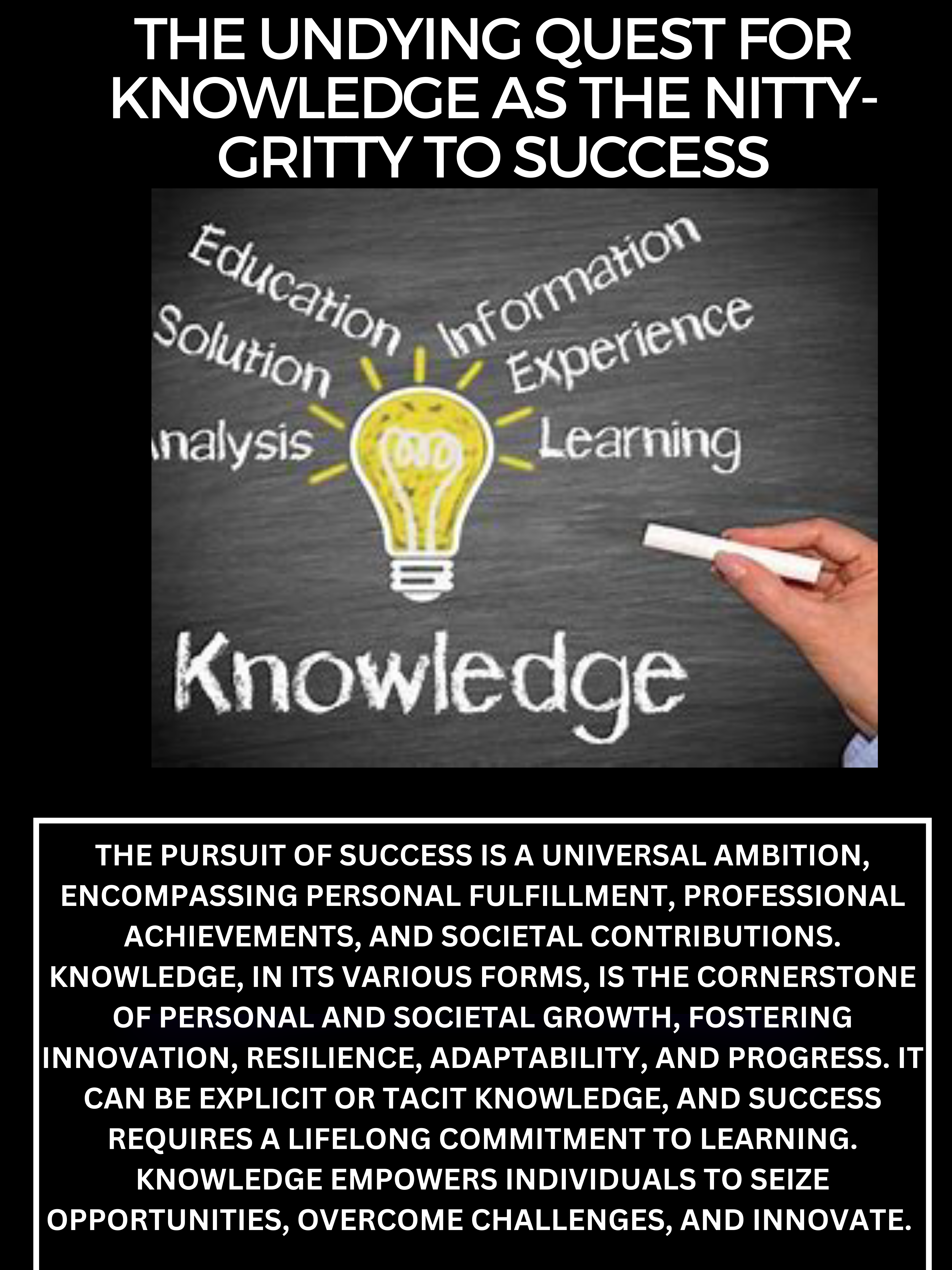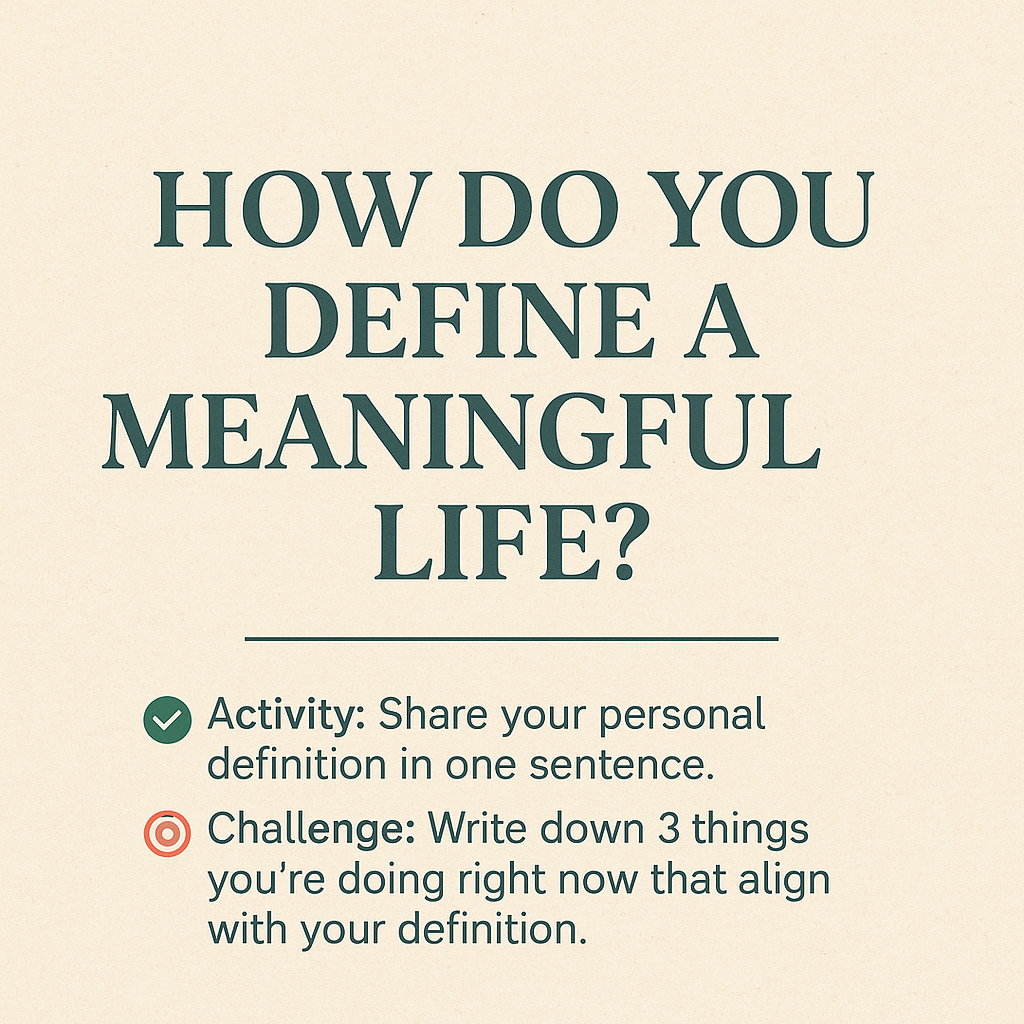
The undying quest for knowledge as the nitty gritty to success
The pursuit of success is a universal ambition, cutting across cultures, societies, and individual aspirations. While the definition of success varies—ranging from personal fulfillment and professional achievements to societal contributions—
one common thread binds all pathways to it: the undying quest for knowledge. Knowledge, in its multifaceted forms, is the cornerstone of personal and societal growth. It serves as the foundation for innovation, resilience, adaptability, and progress.
In this article, we explore how an insatiable hunger for learning forms the bedrock of success.Understanding the Concept of Knowledge.Knowledge is more than just information; it is the synthesis of facts, experiences, and insights that enable individuals to make informed decisions and solve complex problems. It encompasses theoretical understanding, practical application, and the wisdom to navigate life’s challenges.
Knowledge can be categorized into two broad types:
Explicit Knowledge: Easily articulated and shared, such as data, formulas, and documented processes.
Tacit Knowledge: Gained through personal experiences, intuition, and internalized skills.Success in any domain requires a blend of both, nurtured by a proactive and lifelong commitment to learning.The Role of Knowledge in Achieving SuccessThe relationship between knowledge and success is profound. Knowledge empowers individuals to seize opportunities, overcome challenges, and innovate.
Below are some key ways in which the quest for knowledge underpins success:
1. Empowerment Through Learning:Knowledge equips individuals with the tools to achieve their goals. For example, an entrepreneur must understand market dynamics, customer behavior, and financial management to build a thriving business. Similarly, a student pursuing academic success must acquire discipline, critical thinking, and mastery of subjects.
2. Fostering InnovationAt the heart of groundbreaking ideas and technologies lies a robust foundation of knowledge. Innovators like Thomas Edison and modern-day tech leaders like Elon Musk have demonstrated how deep curiosity and relentless learning pave the way for transformative ideas.
3. Resilience and AdaptabilityIn a world characterized by rapid technological advancements and unpredictable disruptions, knowledge is the anchor that enables individuals to adapt. Those who seek to learn continuously are better equipped to navigate uncertainties and reinvent themselves in changing environments.
4. Enabling Informed Decision-MakingKnowledge is the compass that guides individuals and organizations in making sound decisions. Whether it is a policymaker addressing societal issues or a professional choosing a career path, informed choices are rooted in a solid understanding of relevant facts and contexts.
5. Building ConfidenceThe more knowledgeable an individual becomes, the more confident they are in their abilities. Confidence is a critical ingredient for success, as it fuels persistence and resilience in the face of challenges.The Mindset for an Undying Quest for KnowledgeAn unyielding quest for knowledge is not an innate trait but a cultivated mindset.
Here are some attributes that characterize this mindset:
1. Curiosity:Curiosity is the spark that ignites the desire to learn. It drives individuals to ask questions, seek answers, and explore uncharted territories. The most successful people are often those who maintain a childlike curiosity throughout their lives.
2. Humility:Humility opens the door to learning. Recognizing that no one knows everything fosters an openness to new ideas, perspectives, and corrections.
3. Discipline:Learning requires consistent effort and time. Discipline ensures that individuals stay committed to their learning goals despite distractions and setbacks.
4. Adaptability:The world evolves constantly, and so does the body of knowledge. An adaptive learner remains relevant by staying updated with the latest trends, technologies, and insights.
5. Perseverance:The journey of acquiring knowledge can be challenging, but perseverance ensures that setbacks are seen as opportunities for growth rather than reasons to quit.
Practical Steps to Foster Lifelong LearningThe pursuit of knowledge should be a deliberate and structured process. Here are some practical steps to help:
Set Learning Goals: Define clear objectives for what you want to learn and why. Goals provide direction and motivation.Leverage Resources: Make use of books, online courses, podcasts, and mentors. The digital age offers an abundance of learning materials at your fingertips.
Engage in Reflective Practice: Regularly evaluate your learning experiences. Reflecting on successes and failures deepens understanding.
Seek Diverse Perspectives: Engage with people, cultures, and disciplines outside your comfort zone. This broadens your worldview and enriches your knowledge.
Embrace Challenges: Step out of your comfort zone and take on tasks that stretch your abilities. Growth often comes from overcoming obstacles.
Historical and Modern Examples of Knowledge-Driven SuccessHistory and contemporary society abound with examples of individuals who achieved greatness through their quest for knowledge:
Leonardo da Vinci: A polymath who excelled in art, science, and engineering, da Vinci's insatiable curiosity and multidisciplinary approach remain a testament to the power of learning.Marie Curie: Her groundbreaking research on radioactivity exemplifies how dedication to knowledge can lead to world-changing discoveries.
Elon Musk: A self-taught entrepreneur in fields as diverse as electric vehicles, space exploration, and AI, Musk demonstrates the importance of continuous self-education.
The Societal Impact of KnowledgeThe benefits of an undying quest for knowledge extend beyond individual success. A knowledgeable society is more likely to innovate, address global challenges, and foster equitable growth. Nations that prioritize education and research often lead in economic development, healthcare, and technological advancement.
In Conclusion,the undying quest for knowledge is indeed the nitty-gritty of success. It is the engine that drives personal growth, professional excellence, and societal progress. By embracing a mindset of lifelong learning and actively seeking knowledge in all its forms, individuals and communities can unlock their full potential. Success, as a journey rather than a destination, is paved with the milestones of learning, discovery, and application. In the words of Mahatma Gandhi, "Live as if you were to die tomorrow. Learn as if you were to live forever."



0 COMMENTS